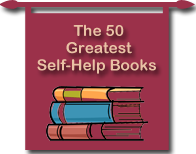Self Help Books and Self Improvement
Self Improvement as a secular principle stretches far back in Western classical antiquity. Hesiod?s Works and Days taught moral precepts for self-betterment. The Stoics offered popular guidance designed to lead to eudaimonia -- well-being, welfare, flourishing.
First Self Improvement Books: Benjamin Franklin and Self Help
Benjamin Franklin?s beloved Poor Richard?s Almanac (beginning in 1732) was founded on the precept, ?Heaven helps those who help themselves.? In 1859 Samuel Smiles published the first overtly self-conscious self improvement book, entitled Self Help. Then the floodgates opened!
Early twentieth-century classics of self improvement included Dale Carnegie?s How to Win Friends and Influence People; Napoleon Hill?s Think and Grow Rich; and James Allen?s As a Man Thinketh.
The Self Improvement Tradition in the US
While there are worldwide traditions of guidance for self improvement, including stories and fables and proverbs and religious teachings, it is in the United States that the concept of self improvement has been most fully embraced. Ben Franklin?s mythic status as one of the Founders of the Republic, and his self-constructed narrative of being a self-made man helped to lodge the self improvement gene deep in the nation?s DNA.
The frontier mythos of hardy, ingenious and hard-working men and women has come down to us today in the sense that for many, it is desirable to learn about and do things ourselves, with the attendant savings in costs and the satisfaction of achievement.
Self Improvement and the Self Help Genre
Perhaps the largest subset of Self Improvement instruction comes via the self help genre. These materials (books, seminars, videos, etc.) are designed to provide support and guidance in dealing with particular problems in life, whether mental, emotional, financial or legal. Sometimes these authors and teachers opine that the feeling that one has so many problems is in fact something to work on!
Self Improvement and the Quality of Life
Other Self Improvement guidance takes the form of encouragement and information about how to live a life of optimal quality, like the Stoics? teachings on eudaimonia. It?s not focused on fixing problems, but more about learning how to set priorities for the highest quality of life, or how to pay attention to one?s ultimate values and most profound desires.
Self help books thus are a large subset of the larger Self Improvement phenomenon, which has an ancient pedigree and a place of honor in the American psyche. Learning how to ?Do It Yourself? seems to resonate deeply, whether we are dealing with bipolar disorder, or want to retile the bathroom.
The Guide to Self Help Books is proud to play a small role in disseminating useful information. We are thus squarely in the honorable tradition of Self Improvement. The Guide to Self Help Books is thus ?self help about finding the best self help.?

